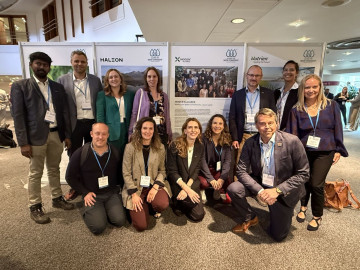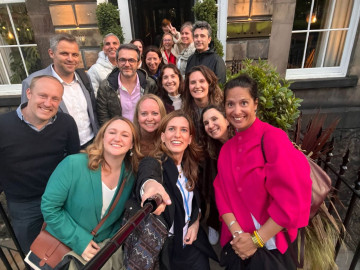"What resonated most throughout the AWS Forum is that water stewardship is no longer a side conversation in sustainability, it is central to business resilience, climate adaptation, and community well-being. The dialogue showed us that real progress depends on linking risk and finance with collective action, clear communication, and outcome-driven basin thinking. Stewardship is evolving into a shared responsibility, and the challenge now is to translate ambition into practical, local action that delivers measurable impact." – Alex Perryman, Head of Water Services at Antea Group UK.
This year’s Alliance for Water Stewardship (AWS) Forum in Edinburgh brought together leaders from more than 160 organizations across 39 countries to explore how water connects everything from supply chain resilience and biodiversity to finance and community well-being. The conversations underscored that water stewardship is no longer a niche concern, but a strategic imperative woven into climate resilience, economic stability, and ESG performance. Alongside the launch of AWS Standard Version 3.0, new initiatives on capacity-building and nature-based solutions highlighted a stronger focus on practical implementation at both site and catchment level. With diverse case studies and candid discussions, the call to action was unmistakable: credible, collective action on water is essential for a resilient future.
Summary of Key Takeaways
- Water risk to operations is a strategic starting point for stewardship, with data and reporting as key enablers.
- Watershed health must be the ultimate indicator of success, moving beyond compliance-based box-ticking to outcome-driven basin thinking.
- Water stewardship is evolving into a strategic, cross-sector priority, deeply linked to climate resilience, biodiversity, and economic stability. It is embedded in corporate sustainability, supply chains, and ESG mandates.
- Finance is a critical enabler, with calls for creative, localized funding models and stronger integration into ESG and investment frameworks.
- Collective action is essential but complex, requiring trust, transparency, and local ownership to succeed.
- Communication matters, simplifying language and storytelling are vital to engaging stakeholders, driving action and breaking out of echo chambers.
- Policy frameworks must catch up, with stronger integration of water into climate adaptation plans and global governance. Scalable impact will come from localised solutions, backed by strong partnerships between government, business, and finance
- AWS Standard Version 3.0 introduces streamlined requirements, deeper integration of climate and biodiversity, and new expectations for collective action and water reuse.
- New AWS initiatives, including capacity-building programmes and expanded guidance on nature-based solutions, signal a stronger focus on practical implementation at site and catchment level.
Head over to the Inogen Alliance blog to read more key insights that stood out from our Global Water Working Group or contact Alex Perryman directly for more information.


Have any questions?
Contact us to discuss your environment, health, safety, and sustainability needs today.






